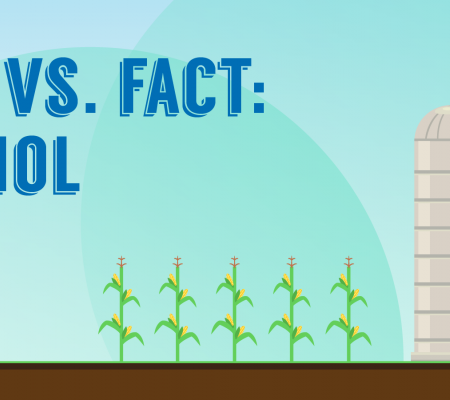Welcome to the second post in our series covering myths and facts of alternative fuels. If you missed the first about ethanol, check it out here. Below, we clear up some of the misinformation around biodiesel, a cleaner burning biofuel to replace petroleum diesel.
Biodiesel is a renewable, biodegradable fuel alternative that can be manufactured from vegetable oil (most commonly soy), animal fats, even recycled cooking grease. Similar to ethanol, pure biodiesel - or B100 - is most often blended with conventional petroleum fuel for use in diesel engines.
MYTH
Biodiesel is only for "tree huggers."
FACT
Before we go any further, we want to state publically that we love trees, and encourage anyone so inclined to hug away. You don’t have to be a flower child, though, to appreciate the value of biodiesel as a fuel source. The U.S. military is one of the largest users of biodiesel, and has set initiatives to replace its use of fossil fuels with alternative fuel sources over the next several years. The National Parks Service, U.S. Postal Service, school districts, universities and municipalities across the United States also use biodiesel blends.
MYTH
Biodiesel requires more energy to produce than is provided by the fuel.
FACT
We hear this one a lot, and not just about biodiesel. It’s a common myth about ethanol as well. Studies, have shown that biodiesel provides two to three times more energy than it requires to produce. It can also be produced using sources grown and harvested here in the U.S., reducing our dependence on imported fuels.
MYTH
Biodiesel increases net greenhouse gas emissions when taking into consideration the entire production process from farm to wheels.
FACT
Studies have shown that, compared to petroleum diesel, biodiesel significantly reduces tailpipe emissions. In fact, it is the first - and only - domestically produced and commercially available biofuel that meets the EPA’s “advanced” classification, meaning that it reduces greenhouse gas emissions by 50% compared to petroleum diesel. Further, the National Renewable Energy Laboratory found that pure biodiesel reduces toxic air emissions - like carbon monoxide, particulate matter and sulfur oxides - by as much as 90% when compared to petroleum diesel.
MYTH
You must convert your vehicle to run on biodiesel.
FACT
Biodiesel and petroleum diesel are very similar in chemical structure, which means that biodiesel fuel blends will work in almost any diesel engine. Biodiesel even presents certain benefits to your engine. It has higher lubricity compared to petro-diesel, so it reduces wear and tear on your engine over time. It is also powerful solvent and will clean out old fuel residue from your engine. It may do such a good job of cleaning out old residue that you’ll need to replace fuel filters initially. Chances are though, this is the most you’ll have to do to switch your diesel engine to run on biodiesel. Most engine manufacturers approve biodiesel blends, but if you aren’t sure, check with your manufacturer.
Alternative fuels are important stepping stones in breaking our dependence on fossil fuels and cleaning up our air. To learn more about biodiesel and other alternative fuels, check out our interactive infographic.
